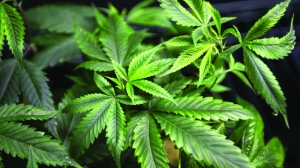By Olivia Hart
Contributing Writer

On the morning of Jan. 18, all Simmons residents received an email from Residence Life regarding the college’s stance on on-campus marijuana usage in the wake of Massachusetts’ legalization of recreational marijuana in December of 2016. This groundbreaking step makes the state the first in the Northeast to legalize marijuana for recreational use, potentially opening up the frontier for more eastern states to follow suit in coming years.
Many pro-legalization college students and other residents across the state are celebrating this advance in eliminating marijuana prohibition for various reasons, whether for recreational or medicinal purposes. ResLife, however, explained that Simmons’s current policy will remain the same despite this change in state law.
The Drug Free School and Communities Act, first established in 1986, mandates that all U.S. educational institutions that receive federal funding must foster drug-free environments through drug prevention regulations. While Simmons is technically a privately-funded institution, the vast majority of colleges and universities in the U.S. receive some level of federal funding whether or not the college or university is public or private.
In the email, ResLife pressed that federal funding is “a primary source of financial and scholarship aid” at Simmons, and any act of the College in defiance of the Drug Free School and Communities Act risks losing all federal funding. This can include Pell Grants, study abroad grants, federal student loans, research grants, and other important sources of income for the school and all of its students.
The second point brought up by ResLife reminds students that Simmons College, as an accredited educational institution, is subject to not only local and state laws, but federal laws as well. While marijuana is now legal in Massachusetts, it is still illegal to possess at a federal level for all recreational purposes (it’s currently classified as a Schedule I drug), and for most medical purposes. Simmons’s policies on alcohol differ from its policies on marijuana for exactly that reason — alcohol is legal at a federal level, but cannabis is not.
Amelia McConnell, the Director of Residence Life at Simmons, mentioned a similar situation from when she worked at another university’s Residence Life office when Massachusetts decriminalized marijuana in 2009: “When that passed, students took it the wrong way — people started smoking on campus, and we had to remind them that just because this law changed didn’t mean that the school’s policies were changing.” State legalization of marijuana is potentially a small step towards federal legalization, but while it’s still federally illegal, Simmons’s policy will not adapt.
The email also reminded students of Simmons’s tobacco-free policy, since it’s been a Smoke-Free Campus since 2014. The email directly cites a statement of this policy: “Use of all smoking and tobacco products is prohibited at both the academic and residence campuses of Simmons College.”
“Students have been very inquisitive,” McConnell said. “We’ve gotten lots of questions from not only residents, but RAs, et cetera.”
She acknowledged the current cultural shift regarding marijuana, but wants to clearly communicate to all members of the College that Simmons’s policy has not changed. She also emphasized that Simmons’s drug policy conduct focuses on being educational rather than punitive (at least for initial violations).
“Overall, I would just encourage students to have self-awareness and awareness of our policy,” McConnell said.
She encourages those who are interested to ask any and all questions they have by contacting her directly at amelia.mcconnell@simmons.edu, emailing the ResLife office at reslife@simmons.edu, or contacting the Office of Student Affairs. Students can also look up Simmons’ drug and alcohol policy by referring to the Simmons’ Student Handbook.












